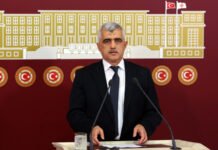A lieutenant in the Turkish military taken to a horse stable after a coup attempt in Turkey on July 15, 2016 recounted the torture he underwent there to the Euronews news website.
Dozens of men sitting half-naked, hands tied from behind, sitting facing the wall of the horse stable that appeared in the above iconic picture taken four years ago at a horse stable in Ankara were military personnel detained after the coup attempt.
Two hundred fifty-one people were killed and 2,200 were injured in the failed coup, which the Turkish government accuses the faith-based Gülen movement of masterminding, an accusation strongly denied by the movement.
Summoned with a WhatsApp message
Among those rounded up at the Gaffar Okkan Equestrian Facilities was Lt. Muhammed Emin Gündoğdu, who was ordered to report to the Gendarmerie Schools Command by his commander on July 15 for night training.
Gündoğdu, currently living in Germany, had completed preparations to visit his family in the neighboring city of Konya when he received the message on WhatsApp from his commander, ordering him to be present on the night of July 15 for the training.
The commander who called them for training was not there
Some 300 lieutenants gathered upon the order in the evening. Yet the commander who summoned them for the training was absent. The other commanders talked about the possibility of a terrorist attack and unlike previous trainings distributed ammunition.
The lieutenants were wondering if it was an attack by the Islamic State in Iraq and Syria (ISIS) or a radical group.
Young soldiers were sent to various parts of Ankara. Forty lieutenants were told that they would go to the Beştepe Presidential Palace to protect President Recep Tayyip Erdoğan against a possible attack.
This group, however, was taken instead to the Gendarmerie General Command opposite the presidential palace. According to Gündoğdu, these soldiers were later accused of trying to murder the president.
Among the 36 “coup plotters” sent to the palace and killed that night were two classmates of Gündoğdu: Abdülkadir Karadağ and Ramazan Erdoğan. According to Gündoğdu, his friends lost their lives that night thinking they were protecting the president.
Karadağ’s family, not informed about the death of their son, found his body 15 days later in a tent in the garden of the Ankara Institute of Forensic Medicine. As the authorities refused to allow them to bury him in an official cemetery, they had to lay him to rest on a hilltop in an unmarked grave.
In another incident in Istanbul that night, 21-year-old cadet Murat Tekin was lynched by a mob that took to the streets upon Erdoğan’s call to defend the government.
Gündoğdu was tasked that night along with a group of colleagues with protecting the Gendarmerie Schools Command, which had tanks, helicopters and abundant ammunition.
‘I learned about the coup on TV’
Gündoğdu said he learned about the coup attempt from a televised speech of then-Prime Minister Binali Yıldırım at around 11 p.m.
After waiting until 1 a.m., most soldiers who saw there was no activity went to their barracks and slept. Gündoğdu, who also slept for a few hours, was awakened at 6 a.m. by gunfire.
‘10 people carrying only pistols detained 300 fully armed lieutenants’
Although they tried to explain that they were not involved in any incident, 10 security personnel wanted to detain the soldiers in the military unit.
“We were 300 fully armed officers. Although we were detained by 10 people carrying only pistols, we did not react. We just followed instructions,” he said in summing the situation up.
He was thinking that they would be released shortly after they were handed over to the police.
Gündoğdu said that as there were not enough handcuffs for the 300 lieutenants, the detainees were trying to handcuff each other with their shoelaces to speed up the process.
However, shortly afterwards they were taken to a horse stable filled with filth and a heavy smell and were forced to remove their clothes and sit on the ground.
Gündoğdu claimed that everyone who was taken there was severely beaten and tortured. He added that the police took photos with their personal mobile phones.
“My wrists were bruised because the police attached my handcuffs very tightly. We were forced to go to the toilet in handcuffs, and they did not remove our handcuffs while we were eating.”
When Gündoğdu complained, a police officer said, “You are traitors, be thankful you’re still alive.”
Amnesty International reported that those who were detained after July 15 were kept in a 48-hour stress position and that no food, water or health services were provided to them.
“[P]olice held detainees in stress positions, denied them food, water, and medical treatment, verbally abused and threatened them and subjected them to beatings and torture, including rape and sexual assault,” said Amnesty International, citing witness accounts.
Gündoğdu was kept handcuffed for another four days in detention in a gymnasium where he was sent after two days in the stable.
He spent nine months in prison after being arrested and was caught when trying to leave Turkey illegally, upon which he spent another 13 months in prison.
“Not only did they discharge me from the service and imprison me, they also subjected me to discrimination in society. Furthermore, they barred me from getting another job. My relatives cut off all relations with me. Our neighbors verbally abused me and my family, they labeled us as traitors.”
In January 2020 he managed to make it to Greece. From there he went to Germany where, since 2016, 39,000 Turkish nationals have sought political asylum.
At a hearing held at the Ankara 20th High Criminal Court on June 30, the prosecutor demanded a life sentence for Gündoğdu.
“They would not let me lead a normal life in my own country,” said Gündoğdu. “I left Turkey reluctantly.”
















[…] Source link […]